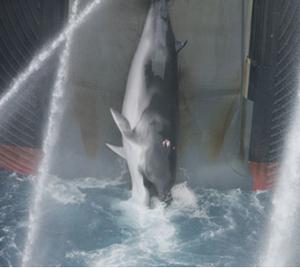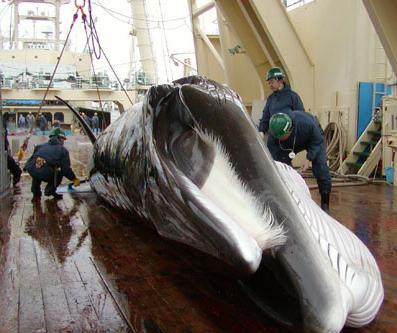Global Whaling Moratorium Stands as IWC Shelves Compromise Plan
AGADIR, Morocco, June 23, 2010 (ENS) – A controversial plan that would have meant the end of a 24-year long moratorium on commercial whaling was today put on ice for a year by the International Whaling Commission at its annual meeting.
The 88 IWC member governments meeting in Agadir failed to agree on the proposed compromise between whale conservation nations and whaling nations that would have legalized whaling in return for bringing the hunt under IWC control.
Currently, three whaling nations – Japan, Norway and Iceland – set their own quotas without regard for the moratorium observed by all other countries.
 |
Japan conducts “research” whaling in Antarctica’s Southern Ocean and North Pacific under a provision of the IWC treaty, while Norway and Iceland have taken objections to the IWC moratorium. The three countries have killed more than 33,000 whales since the the moratorium took effect in 1986.
The proposal by IWC chairman Cristian Maquieira of Chile and vice chairman Anthony Liverpool of Antigua and Barbuda was the result of three years of negotiations, but even they have said repeatedly that it does not reflect their personal views and was tabled merely as a basis for discussion.
It would allow Japan to hunt up to 120 minke whales a year in Japanese coastal waters. It would also cut Japan’s annual catch quota of minke whales in the Antarctic Ocean from around 850 at present to 400 for the next five years and 200 over the following five years.
In Agadir today, Liverpool, acting as IWC chairman in the absence of Maquieira who is ill, recommended a deferral until next year’s meeting, saying the positions of member governments remain far apart.
Yasue Funayama, Japanese parliamentary secretary for agriculture, forestry and fisheries, criticized countries, such as Australia and New Zealand, that want to eliminate whaling in the Antarctic Ocean.
Funayama said these nations could not accept the proposal even as a basis for discussions because of their own domestic politics.
Australian Environment Minister Peter Garrett today welcomed developments “to abandon” the compromise plan.
 |
Minke whale is winched aboard a Japanese whaling vessel in the Southern Ocean. (Photo by Jeremy Sutton-Hibert courtesy Greenpeace) |
“Lifting the moratorium on commercial whaling would have been a serious and retrograde step. That is why Australia has fought so hard against this proposal, along with many like-minded, pro-conservation nations both in the lead-up to the IWC and here on the floor of the commission,” said Garrett.
“It is now time to close the door on that proposal and move forward, whilst building on the increased understanding that has emerged from these processes,” he said.
“New Zealand is firmly committed to the elimination of whaling in the Southern Ocean,” said Foreign Minister Mike McCully. “We want to see a significant improvement on the status quo, with an end to whaling in the Southern Ocean at the earliest achievable date.”
The United States, which played the role of mediator between pro-whaling and anti-whaling countries, said in a statement today, “We regret that the IWC failed to reach agreement on a new paradigm that would improve the conservation of whales. Throughout this process, the United States has given its unwavering support to the commercial whaling moratorium and worked diligently to achieve an end to the lethal scientific and commercial whaling that continues to take place in spite of the moratorium.”
“While the U.S. did not support the Chairs’ proposal, we have participated in the IWC’s “future process” with the express purpose of reforming the Commission, taking substantial and real steps to end non-indigenous whaling, and refocus the IWC on conservation issues, including ocean noise, climate impacts, and bycatch.”
The reactions of environmental groups range from disappointment that a deal was not achievable to relief that the whaling moratorium will be maintained.
The Pew Environment Group, WWF, and Greenpeace had supported a compromise, subject to conditions outlined in the lead-up to the IWC meeting.
Susan Lieberman, Pew Environment’s director of international policy, said, “We are deeply disappointed that the governments present here, after more than three years of intense work, could not reach a solution that will benefit whale conservation.”
“The lack of sufficient flexibility shown by Japan to phase out its whaling in the Southern Ocean Whale Sanctuary prevented a decision from being adopted. Continuation of the impasse here may retain the whaling moratorium on paper, but unregulated whaling outside of IWC control, by Japan, Norway, and Iceland, will now be able to continue,” said Lieberman.
 |
Minke whale taken by Japanese whalers is examined as part of the “research” program in the Southern Ocean. (Photo courtesy Institute of Cetacean Research) |
The Southern Ocean Whale Sanctuary is an area of 50 million square kilometers surrounding the continent of Antarctica where the IWC has banned all types of commercial whaling. The sanctuary was established by the IWC in 1994 with 23 countries supporting the agreement and Japan opposing it.
Lieberman said today, “We had hoped that for the first time since World War II, the waters of the Southern Ocean, the fragile waters off of Antarctica, would finally be free of high seas whaling vessels. The key reaching that positive outcome at this meeting was always in Japan’s hands – and now only Japan can decide if the Southern Ocean Whale Sanctuary will exist in reality, or only on paper.”
Greenpeace Japan Programme Director Junichi Sato said, “After another year of talking at the IWC, and all that we will have got is another year older while the blood of thousands more whales spilled as Japan, Norway and Iceland pursue their commercial whale hunts with impunity.”
“The time has come for pro whale conservation Governments to move beyond rhetoric and brinkmanship,” said Sato. “Talk without action is just that – talk.”
Said Wendy Elliott, WWF International Species Manager, “A compromise solution which brings whaling under the control of the IWC is clearly needed, and governments at this meeting failed to find a way forward. Once again, they have put politics before science.”
“This brings into question the integrity of the Commission and its ability to make meaningful decisions that benefit whale conservation,” Elliott said.
“Under a cloud of corruption allegations the IWC is taking a safe course, opting for a cooling off period that protects the moratorium and other IWC conservation measures,” said Patrick Ramage, director of the International Fund for Animal Welfare’s Global Whale Campaign. “Had it been done here, this deal would have lived in infamy.”
“This was an intense three year effort but one conducted behind closed doors and focused on defining terms under which commercial whaling would continue rather than how it would end,” said Ramage.
“The proposal it produced could not withstand public scrutiny and ignored the overwhelming global support for permanent protection for whales,” Ramage said. “Any future process of negotiation should not leave the views, expertise, and perspective of the global NGO community sitting outside.”
Copyright Environment News Service (ENS) 2010. All rights reserved.
© 2010 – 2012, Environment News Service. All rights reserved. Content may be quoted only with proper attribution and a direct link to the original article. Full reproduction is prohibited.
